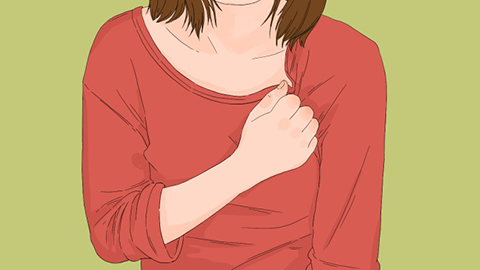Why do I experience chest tightness and shortness of breath without coughing?
Generally, chest tightness and shortness of breath without coughing may be caused by emotional factors, strenuous exercise, allergic rhinitis, chronic bronchitis, chronic obstructive pulmonary disease (COPD), and other reasons. Symptomatic treatment such as general treatment and medication may be needed. If symptoms persist, it is recommended to seek medical attention promptly and receive appropriate treatment under a doctor's guidance. Detailed analysis is as follows:

1. Emotional factors
Emotional tension, anxiety, and fear may cause rapid breathing and a sensation of chest tightness. When a person is in a state of psychological stress, the body secretes hormones that affect the respiratory and cardiovascular systems, resulting in a feeling of chest tightness and shortness of breath, which may be accompanied by symptoms such as mental tension, insomnia, and vivid dreams. It is recommended to maintain good lifestyle habits and mindset, and relax by listening to music, meditating, traveling, and other methods.
2. Strenuous exercise
During strenuous exercise, the body requires more oxygen and energy, and the respiratory and circulatory systems work faster to meet the body's needs. However, if the intensity of exercise is too high or the duration too long, it may cause temporary dysfunction of the respiratory tract's ventilation function, leading to symptoms of chest tightness and shortness of breath, which may be accompanied by muscle pain, fatigue, and other symptoms. It is recommended to perform appropriate warm-up activities before exercise to reduce the physical impact of exercise.
3. Allergic rhinitis
Allergic rhinitis can be triggered by genetic factors and environmental allergens. The chest tightness and shortness of breath caused by allergic rhinitis result from nasal congestion due to nasal mucosal swelling and increased secretions, which affects respiratory function and causes symptoms of chest tightness and shortness of breath. These symptoms may be accompanied by nasal congestion, runny nose, sneezing, and nasal itching. It is recommended to follow medical advice and use antiallergic medications such as diphenhydramine hydrochloride tablets, promethazine hydrochloride tablets, and ebastine tablets to relieve symptoms.
4. Chronic bronchitis
Chronic bronchitis can be caused by disordered immune function of the body, airway hyperresponsiveness, and other factors. Patients with chronic bronchitis may experience hypoxia due to impaired gas exchange function, leading to symptoms of chest tightness and shortness of breath, which may be accompanied by sputum production, wheezing, and dyspnea. Patients should use medications such as roxithromycin dispersible tablets, compound sulfamethoxazole tablets, and levofloxacin hydrochloride capsules as recommended by their doctors.
5. Chronic obstructive pulmonary disease
Chronic obstructive pulmonary disease is a chronic lung disease mainly caused by long-term smoking, air pollution, and other factors. Its characteristics include airway obstruction and reduced lung function, leading to difficulty breathing. Patients may also experience long-term cough, sputum production, and abnormal breath sounds. It is recommended to use medications such as theophylline sustained-release tablets, salbutamol inhalation aerosol, and salbutamol sulfate sustained-release capsules under a doctor's guidance.
It is also recommended to regulate breathing in daily life by practicing slow abdominal breathing. Inhale deeply through the nose to make the abdomen rise, then exhale slowly through the mouth, repeating this process several times to help improve the respiratory condition.





